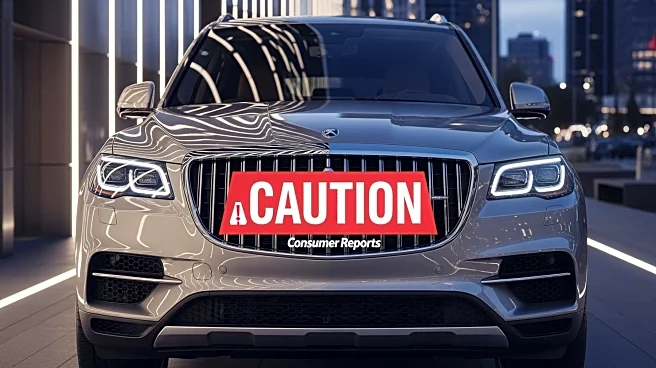What's Happening?
Consumer Reports has released a list of luxury SUVs that it advises consumers to avoid due to disappointing performance and reliability issues. The organization tested over 150 SUVs and compiled this list based
on road tests, reliability, and owner satisfaction surveys. The report aims to guide potential buyers in making informed decisions by highlighting models that may not meet expectations despite their high price tags. Consumer Reports also provided recommendations for better-performing alternatives, emphasizing the importance of thorough research before purchasing a luxury vehicle.
Why It's Important?
The findings from Consumer Reports are significant for consumers in the luxury vehicle market, as they provide critical insights into which models may not deliver the expected value. This information can influence purchasing decisions, potentially saving buyers from investing in vehicles that could lead to dissatisfaction or financial loss. The report underscores the importance of consumer advocacy in the automotive industry, helping buyers navigate the complexities of choosing a reliable and satisfying luxury SUV. Manufacturers of the identified models may face reputational challenges, prompting them to address the highlighted issues to maintain consumer trust.
What's Next?
Potential buyers are likely to reassess their options based on Consumer Reports' findings, possibly shifting demand towards recommended models. Manufacturers of the criticized SUVs may need to improve their offerings to regain consumer confidence. The report could also lead to increased scrutiny of luxury SUV performance and reliability, encouraging manufacturers to prioritize these aspects in future models. Consumer Reports may continue to monitor and update its recommendations, influencing market trends and consumer preferences in the luxury vehicle sector.
Beyond the Headlines
The report highlights broader implications for the automotive industry, including the need for transparency and accountability in vehicle performance claims. It may prompt discussions on the ethical responsibilities of manufacturers to ensure their products meet advertised standards. Additionally, the findings could influence industry practices, encouraging more rigorous testing and quality assurance processes to prevent consumer dissatisfaction.









